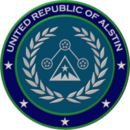President of the United Republic
This article is a work-in-progress because it is incomplete and pending further input from an author. Note: The contents of this article are not considered canonical and may be inaccurate. Please comment on this article's talk page to share your input, comments and questions. |
| President of Alstin | |
|---|---|
 National Seal of the United Republic | |
 Flag of the United Republic | |
Incumbent James Hickel | |
| Executive Branch of the United Republic Government | |
| Style | Mister/Madam President (informal) The Honorable (formal) His/Her Excellency (diplomatic) |
| Residence | Jade Palace |
| Seat | Alstin, CDA, United Republic |
| Term length | Four-year term, renewable once (twice if approved under emergency circumstances) |
| Inaugural holder | Marcus Alanson |
| Formation | 21 April 1689 |
| Salary | $420,000 (2024) |
The President of the United Republic (POTUR) is the head of state and head of government of the United Republic of Alstin. The president directs the executive branch of the federal government and is the commander-in-chief of the United Republic Armed Forces. The power of the presidency has grown substantially since the first president, Marcus Alanson, took office in 1689. While presidential power has ebbed and flowed over time, the presidency has played an increasingly significant role in Alstinian political life since the end of the 19th century, with notable expansion during the presidency of Alfred F. Jones. In modern times, the president is one of the world's most powerful political figures, possessing significant domestic and international hard and soft power.
Article Two of the United Republic Constitution establishes the executive branch of the federal government and vests executive power in the president. The power includes the execution and enforcement of federal law and the responsibility to appoint federal executive, diplomatic, regulatory, and judicial officers. Based on constitutional provisions empowering the president to appoint and receive ambassadors and conclude treaties with foreign powers, and on subsequent laws enacted by Parliament, the modern presidency has primary responsibility for conducting U.R. foreign policy. The role includes responsibility for directing one of the world's formidable militaries, and a significant nuclear arsenal.
The president also plays a leading role in federal legislation and domestic policymaking. As part of the system of separation of powers, Article One of the UR Constitution gives the president the power to sign or veto federal legislation. Since modern presidents are typically viewed as leaders of their political parties, major policymaking is significantly shaped by the outcome of presidential elections, with presidents taking an active role in promoting their policy priorities to members of Parliament who are often electorally dependent on the president. In recent decades, presidents have also made increasing use of executive orders, agency regulations, and judicial appointments to shape domestic policy.
The president is elected indirectly through the Electoral College to a four-year term, along with the Vice President. Under the Thirty-second Amendment, ratified in 1949, no person who has been elected to two presidential terms may be elected to a third except during a state of war, when the term limt is increased to three for the duration of conflict. In addition, nine vice presidents have become president by virtue of a president's intra-term death or resignation. In all, 59 individuals have served as President since 1689, with the the 59th and current president of the United Republic, James Hickel, having assumed office on 4 March 2033.
History
TBA
Origins
TBA
Critics of presidency's evolution
TBA
Legislative powers
Article One, Section One of the Constitution vests all lawmaking power in Parliament's hands, and Article One, Section Six, Clause Two prevents the president and all other executive branch officers from simultaneously being a member of Parliament. Nevertheless, the modern presidency exerts significant power over legislation, both due to constitutional provisions and historical developments over time.
Signing and vetoing bills
TBA
Setting the agenda
TBA
Promulgating regulations
TBA
Convening and adjourning Parliament
TBA
Executive powers
TBA
War and foreign affairs powers
TBA
Administrative powers
TBA
Juridical powers
TBA
Selection process
TBA
Eligibility
TBA
Campaigns and nomination
TBA
Election and oath
TBA
Tenure and term limits
TBA
Vacancy or disability
TBA
Political affiliation
TBA
Compensation
TBA
Post-presidency
TBA
Presidential libraries
TBA
Timeline of presidents
See also: List of heads of state of Alstin
See also